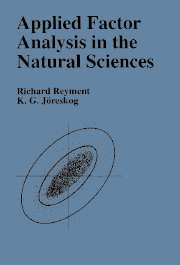Book contents
- Frontmatter
- Contents
- Preface
- Glossary of the most commonly used symbols
- Preface to first edition
- 1 Introduction
- 2 Basic Mathematical and Statistical Concepts
- 3 Aims, Ideas, and Models of Factor Analysis
- 4 R-Mode Methods
- 5 Q-Mode Methods
- 6 Q-R-Mode methods
- 7 Steps in the Analysis
- 8 Examples and Case Histories
- Appendix: Computer programs
- Bibliography
- Index
6 - Q-R-Mode methods
Published online by Cambridge University Press: 12 November 2009
- Frontmatter
- Contents
- Preface
- Glossary of the most commonly used symbols
- Preface to first edition
- 1 Introduction
- 2 Basic Mathematical and Statistical Concepts
- 3 Aims, Ideas, and Models of Factor Analysis
- 4 R-Mode Methods
- 5 Q-Mode Methods
- 6 Q-R-Mode methods
- 7 Steps in the Analysis
- 8 Examples and Case Histories
- Appendix: Computer programs
- Bibliography
- Index
Summary
CORRESPONDENCE ANALYSIS
A method of factor analysis that combines some of the advantages of R-mode and Q-mode techniques was developed by Bénzécri (1973) and his associates under the name of “analyse factorielle des correspondances.”
Bénzécri (1973) gave a detailed account of the theory of his method in a two–volume text, along with numerous examples that were drawn mainly from the social sciences. The Q-R-mode analysis of a table of contingencies has, however, a very long history in statistics and this has been excellently reviewed by Hill (1974). Several geological applications have appeared in the literature, for example, David, Campiglio, and Darling (1974), Melguen (1971) and Mahe (1974). In geology and in other subjects, clandestine applications of the method are common in that the calculations are being applied to continuously distributed variables, whereas the method was designed for scored observations ranged in a contingency table. This subject has been debated by Hill (1974) in a paper that should be studied by anybody wishing to apply correspondence analysis to continuously distributed variables.
There is a useful expositionary article on correspondence analysis in News and Notes of the Royal Statistical Society (1991, vol. 18, p. 13); it is based on a lecture to the society given by M. Greenacre. The book by Lefebvre (1976) contains an instructive introduction to the technique, especially useful because it gives the francophone philosophy of the subject along with the terminology. Other references are Greenacre (1984) and Jongman, ter Braak, and Van Tongeren (1987).
- Type
- Chapter
- Information
- Applied Factor Analysis in the Natural Sciences , pp. 172 - 193Publisher: Cambridge University PressPrint publication year: 1993



